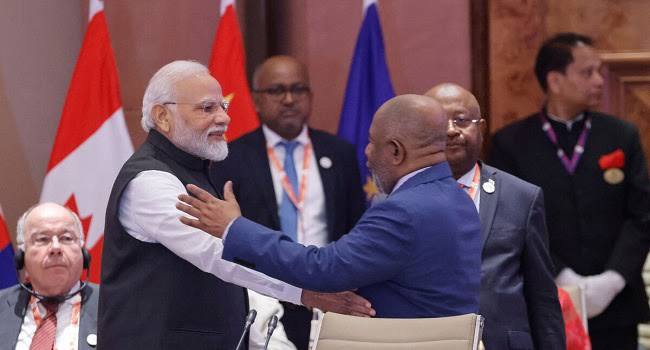Indian PM Modi in a warm lock with Comoros President Azali Assoumani, the AU chair.
The African Union has formally joined the Group of 20 top global economies, Indian Prime Minister Narendra Modi announced on Saturday. He made the declaration during his opening speech at the G20 Summit holding in New Delhi, India.
This historic move signifies a paradigm shift in global governance, where the voices of emerging powers from the Global South are increasingly gaining prominence. However, the implications of the AU's G20 membership reverberate far beyond the confines of diplomatic circles, particularly for a nation like Nigeria.Global Diplomacy Meets Local Realities
Nigeria, as the most populous nation on the African continent and a regional powerhouse, stands at the intersection of global diplomacy and local realities. The AU's entry into the G20 transforms this intersection into a crossroads of opportunity and responsibility.
While it is true that the AU's inclusion in the G20 aligns with Nigeria's vision of a stronger, more influential Africa on the global stage, it also poses a profound philosophical question: What does it mean to hold a seat at the table of the world's most influential economies? It means more than just diplomatic leverage; it signifies the obligation to shape the future of our shared planet.
Balancing Act: Priorities and Responsibilities
Nigeria, like other African nations, must now walk a tightrope between its national priorities and its responsibilities as a member of this exclusive club. This balancing act is a reflection of a broader struggle within the G20 itself, as it grapples with internal tensions and global challenges.
The AU's presence in the G20 can act as a bridge between the Global South and the established powers. It provides an avenue to address pressing global issues, from climate change to financial reform. However, it also underscores the imperative for Nigeria to harmonize its national interests with those of the broader African continent, thereby strengthening the collective voice of Africa.
Influence vs. Responsibility
The AU's membership in the G20 is not solely about influence; it's about wielding influence responsibly. Nigeria must ask itself how it can contribute meaningfully to the global dialogue while ensuring that its decisions align with the aspirations of its people and the continent as a whole. This is not merely a matter of economic policy but of moral and ethical stewardship of the planet's future.
As Nigeria navigates this uncharted territory, it's essential to remember that influence is a two-way street. While the G20 offers Nigeria a platform to shape global narratives, it also compels the nation to listen, learn, and empathize with the diverse challenges faced by others. It's a reminder that the world is interconnected, and true leadership requires not just asserting one's voice but also forging bonds of understanding and cooperation.
Last line : The AU's G20 Membership as a Catalyst for Global Change
In the expansive tableau of history, the African Union's formal entry into the G20 is a brushstroke that adds vibrancy to the canvas of global diplomacy. It represents the evolving dynamics of power, the yearning for fairness, and the collective determination to address shared challenges. For Nigeria, it is both a blessing and a responsibility—an opportunity to shape the world's destiny and a reminder that the pursuit of global harmony requires wisdom, empathy, and a steadfast commitment to the betterment of all humankind.
The end.

Comments
Post a Comment